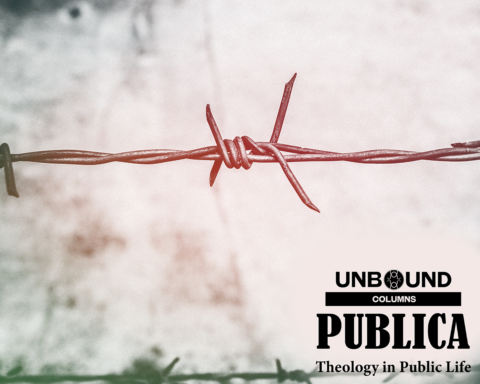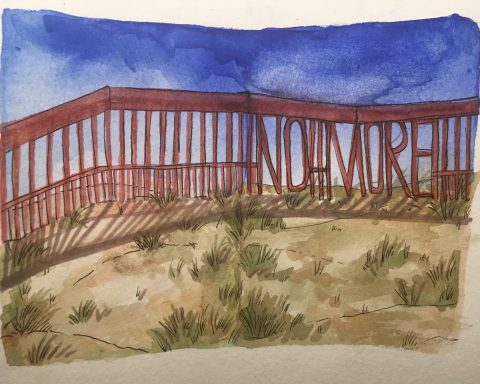A Personal Faith Journey

My favorite book as a child was called “I Like Sunday School.” It followed a little white girl who looked forward to learning about Jesus each week at church, just like me. I spent much of my childhood at church: memorizing Psalm 23 in Sunday School, ringing handbells, singing about the fruits of the spirit, and learning how to locate any Bible passage in ten seconds or fewer.
I was raised in a white Baptist church in the South – not exactly a Southern Baptist, but kind of. My home church, First Baptist Church in Murfreesboro, TN, was associated with both the Southern Baptist Convention and the Cooperative Baptist Fellowship (CBF), a moderate Baptist association. In Sunday School, I was taught both conservative and more moderate theologies—from lessons on how to witness to discussions on our Christian duty to care for others. My dad is an ordained Baptist minister who served as the contemporary worship leader at my church from the time I was 8 years old; my mom served on multiple church committees and played the piano in the worship band.
When I was 16, I went on my church’s youth mission trip to Miami. We served with CBF field personnel in their ministry Touching Miami with Love in Overtown, a once middle-class black community deeply damaged by racist public policy. As a result, the majority of Overtown’s residents live in poverty; drugs and gun violence are their brutal reality. That week, our white youth group led a Vacation Bible School with black kids from the neighborhood.
___________________________________________
My faith – and by extension, my identity – is a product of ecumenism, and it is stronger for it!
___________________________________________
One afternoon, we heard a presentation on the political, social, and racial history of the neighborhood, which highlighted the systemic causes of the poverty in which Overtown’s residents lived. The missionaries working there also spoke to why, as Christians, they felt called to do this work. That presentation sparked something in me. It opened my eyes to what at the time was a new and somewhat radical realization about poverty: it doesn’t exist in a vacuum. There are reasons, social and political reasons, that these children lived lives so different from my own. And, as Christians, we are called to name the reality what it is: unfair. We are called to examine these social and political factors and work for change in the name of Christ. Somehow, even that afternoon, I knew that presentation would change my life.

Photo Credit: Scott Willis
Fast forward to the summer before I began college at Emory University, when I read The Irresistible Revolution by Shane Claiborne. The seriousness with which Claiborne takes Jesus’ radical message challenged the more personal theology I had learned in Sunday School. Was it true, as Claiborne claims, that Jesus came to preach about the in-breaking of the kingdom of God on earth rather than about how to gain eternal life in heaven? I re-read the Gospel of Matthew through this new lens – and my theology started to shift.
Emory’s secular liberal arts environment (with a historical Methodist influence) unsettled my faith in other ways. I was forming friendships with Muslims, Hindus, and Jews, attending interfaith discussions, fasting on Ramadan, and celebrating Holi. My sophomore year, I took two classes on the New Testament, which made me question everything from the authenticity of the Biblical record of Jesus’ ministry to whether Jesus was truly God’s son who rose from the dead. At the same time, our close examination of Jesus’ teaching affirmed Claiborne’s thesis that Jesus’ message had a lot more to do with on our actions for justice on this earth than with how to get into heaven, as I’d learned as a child. With all this swirling in my head, I wasn’t sure what to believe!
___________________________________________
That presentation opened my eyes to what at the time was a new and somewhat radical realization about poverty: it doesn’t exist in a vacuum.
___________________________________________

Photo Credit: Amy Beth Willis
During this time, I connected with the Wesley Fellowship (United Methodist campus ministry) at Emory, but I often felt like I was going through the motions of my faith without much substance. I got to know three people who would become spiritual mentors, all Methodist ministers whom I greatly respected: the chaplain, the campus minister, and the Dean of Religious Life. The Dean, Rev. Susan Henry-Crowe, was the first female pastor I had ever met. Female pastors weren’t explicitly discouraged in my home church, but outside of children’s ministers, they were pretty rare. Rev. Henry-Crowe encouraged me to nurture both my faith and my passion for social justice. At her suggestion, I began to attend the University Worship Service, an ecumenical protestant service on campus using communion liturgy drawn from the United Methodist tradition.
My junior year, I became a deacon. I fumbled to properly light the candles, often forgot to close a scripture reading with ‘This is the Word of the Lord’, and had to research the liturgical calendar. Over the course of my college years, I grew to love these Methodist rituals; they created a space for me to re-discover Christianity. Wesley Fellowship offered a safe space to learn with a group of people who embraced the questions of their faith without requiring clear answers. However, my faith still felt more intellectual than spiritual.
I fell into the world of the Presbyterian Church (U.S.A). by chance. I was interested in doing a faith-based service program after graduation, and my friend who grew up in the PC(USA) told me about the Young Adult Volunteer (YAV) program. I turned in my YAV application alongside my applications to the Episcopal Service Program and the Lutheran Volunteer Corps. I was particularly attracted to the YAV site in Tucson, AZ, because I wanted to work on the border, but I was still somewhat hesitant to participate in a program that seemed so Christian while I was still questioning my faith.
___________________________________________
Wesley Fellowship offered a safe space to learn with a group of people who embraced the questions of their faith without requiring clear answers.
___________________________________________

Photo Credit: Kathryn Lozada
Three months later, I found myself at the Stony Point Center in New York at YAV orientation, where I encountered the most enthusiastic group of Presbyterians I had ever seen, immediately countering my notion of Presbyterians as the ‘frozen chosen’! Somewhere deep down, I knew I had found my people: Christians whose faith and passion for social justice were inseparably tied together. As we sang “Canticle of the Turning” and “Jesu Tawa Pano”, I felt my heart beginning to re-connect to a faith I thought I had lost. This was a foretaste of what I was to experience at Southside Presbyterian Church during my 11 months as a YAV in Tucson.
When I stepped off the plane in Tucson, I was greeted not only by the tall green saguaros and the rush of humid, monsoon-season air, but also by a faith community that would become my spiritual family. At Southside, politics and faith are inseparable. Moreover, social action does not absolve you from growing in your personal relationship with God. The kiva (sanctuary) transformed from worship space to press conference location; the parking lot was full with congregants’ cars on Sunday and day laborers seeking work early Monday mornings. My understanding of ‘church’ was being redefined in the most poignant ways.
Many people told me that Southside is unique among PC(USA) churches. However, in my second YAV year serving in the PC(USA) Office of Public Witness in Washington, DC, I discovered that the PC(USA)’s own social witness policy encourages the radical, kingdom-building work Southside was doing on the ground!
___________________________________________
During my time as a YAV, I had begun to witness the power of choosing to be part of a faith community, not only at the local level, but also at the level of a national denomination.
___________________________________________
At the Office of Public Witness, I got to see the other side of the coin, as I joined in the office’s work of implementing General Assembly policy positions at the federal level and encouraging and educating Presbyterians for their own faith-based advocacy. In December, I helped lead a trip to the borderlands with Stated Clerk Gradye Parsons and other OGA staff. I spent my summer leading Presbyterian youth groups in conversations about justice, mercy, and advocacy, teaching them how to use their faith voice to lobby their representatives for just policy. I met many dedicated Presbyterian Mission Agency staff and some Advisory Committee members. These experiences continued to demonstrate to me the PC(USA)’s commitment to working for the kingdom of God on earth.

Photo: Amy Beth Willis
In Washington, I attended the Church of the Pilgrims, a PC(USA) congregation committed to actualizing their faith through their service-learning center, urban garden, and a Sunday-afternoon meal for hungry neighbors. As a child, I never made the decision to be baptized (Baptists practice believers’ baptism), but I knew that someday I would want to. In early 2015, God began pulling on my heart to take that step of baptism and, by extension, to join the PC(USA).
Even as my YAV housemates joked about surprise-baptizing me as Presbyterian on multiple occasions, I realized that I maintained an unhealthy pride of sorts in my choice not to be Presbyterian, or Baptist, preferring to identify instead as ‘ecumenically minded’. However, during my time as a YAV, I had begun to witness the power of choosing to be part of a faith community, not only at the local level, but also at the level of a national denomination. My immigration advocacy on the Hill through the OPW was strengthened by Southside’s border ministry. The ministry of the local church informs that of the national church; they other make each other possible. God was calling me to choose this denomination from which to build God’s beloved community.
___________________________________________
My immigration advocacy on the Hill through the OPW was strengthened by Southside’s border ministry. The ministry of the local church informs that of the national church; they make each other possible.
___________________________________________
So, one humid July evening, Rev. Sarah Cairatti, my D.C. YAV site coordinator baptized me in the lush garden of Church of the Pilgrims, encircled by a community of church members, friends, and fellow YAVs. I had found my people, a denomination that was flawed but full of committed followers of Christ, seeking to participate in the transformation of themselves and the world, with the Spirit as guide.

Photo: Amy Beth Willis
My two years as a YAV showed me that justice work through Christian communities was not only possible, but in fact immensely fulfilling. Seminary seemed like the logical next step to exploring this passion. And so I applied to Union Theological Seminary in New York City, where I am now a first-year student. Union is an ecumenical seminary with Presbyterian roots, and it is deeply committed to the praxis of faith.
In my first few months, I have already encountered a diverse spectrum of theological opinions and perspectives, both within class materials and especially among my peers. My faith is being stretched in new ways as I seek nuanced interpretations for divine violence in the Bible and integrate feminist theologians’ critique of a male Savior. However, I feel grounded; the eclectic phases of my faith journey have prepared me precisely for this!
At Union, I’ve come full circle, for seminary is (in some ways) like a round-the-clock Sunday school class!
___________________________________________
On Capitol Hill, the PC(USA) speaks in conjunction with other faith-based and justice-oriented groups. We are heard because of our coalition-building. I believe that this holds true for the entire work of the Church.
___________________________________________

Photo: Amy Beth Willis
As my next three years of study continue to shape my future ministry, I bring my passion for and commitment to ecumenical work. On Capitol Hill, the PC(USA) almost always speaks in conjunction with other faith-based and justice-oriented groups. We are heard because of our coalition-building. I believe that this holds true for the entire work of the Church. The PC(USA), like any denomination must be in conversation with other denominations and with other faith traditions. We can speak with our unique Presbyterian voice (recognizing the diversity within even that voice) without denying the truth of others. This is where our power to truly build God’s kingdom lies.
I am proud to say that my faith been molded and formed by three denominations, as well as through my relationships with people of other denominations and of other faith traditions. My faith – and by extension, my identity – is a product of ecumenism, and it is stronger for it.
___________________________________________________________
AUTHOR BIO: Amy Beth Willis is 1st-year MDiv student at Union Seminary in NYC. She graduated from Emory in 2013 with a bachelor’s degree in Sociology. After college, she served as a Young Adult Volunteer in Tuscon, AZ, working at Southside Presbyterian and in Washington, D.C., at the PC(USA) Office of Public Witness. She was raised in Middle Tennessee.
Learn about the ecumenical advocacy of the Office of Public Witness!
Learn about ecumenical advocacy in the context of the United Nations!





Unbound Social